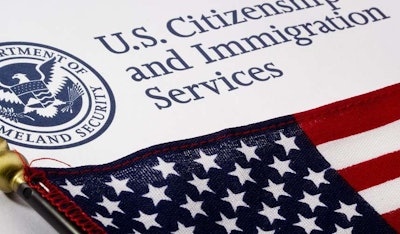
The legislation passed June 4 in a 237-187 vote, with seven Republicans joining the Democratic majority. The measure next heads to the Senate, where it is expected to die. President Trump has said he would veto the bill if it reaches his desk.
 Stephen Sandherr
Stephen SandherrAGC CEO Stephen Sandherr, however, hopes a bipartisan deal can be reached on the legislation and calls on the Senate to pass the House bill or include its provisions in a broader immigration reform package.
“Failure to act will remove tens of thousands of men and women from the domestic construction workforce at a time when a vast majority of contractors report difficulty finding qualified workers to hire,” he said. “Without these workers, construction projects in many parts of the country, particularly in regions with a large presence of so-called dreamers and individuals with temporary protected status, are likely to be significantly disrupted.”
The term Dreamers refers to people born in the United States of parents who came to the country illegally. Immigrants with temporary protected status (TPS) have come from countries the U.S. recognizes, or formerly recognized, as experiencing crisis conditions.
“The men and women covered by this measure are making essential contributions to economic development and infrastructure projects across the country,” Sandherr said.
“Moreover, this measure represents an important first step in reforming the nation’s broken immigration system. Indeed, this association has long championed, and continues to advocate for, broader reforms to our immigration system that include enhanced border security measures and market-based guest worker programs.”
The U.S. Chamber of Commerce notes that Dreamers and TPS beneficiaries not only provide much-needed labor, but many Americans owe their jobs to them.
“American businesses across a host of industries are very concerned about the uncertain future facing their employees who are Dreamers or beneficiaries of the TPS program,” according to a chamber briefing on the bill. “In addition, many American workers are employed by businesses started by Dreamers or TPS recipients.”
The chamber notes that more than 1 million Dreamers and TPS beneficiaries are authorized to work in the United States, and their deportation would increase the labor shortage and hurt the country’s prospects for economic growth.
Opponents of the bill say it grants amnesty to people who have entered or stayed in the country illegally. They also say it does not address the issue of immigrants continuing to illegally cross the U.S.-Mexican border.
The Trump administration has been trying to end the Deferred Action for Childhood Arrivals (DACA) program, but has hit setbacks in the courts. The program gives temporary legal status to 700,000 children of illegal immigrants. The House bill, H.R. 6 American Dream and Promise Act of 2019, would also allow 1.6 million immigrants eligible for DACA but not enrolled to apply for permanent residency. The Trump administration has also caused TPS for several countries to end, affecting about 300,000 people.
The bill calls for eliminating deportation proceedings against Dreamers and TPS beneficiaries. Dreamers would be granted conditional permanent residence status for 10 years, if they meet certain conditions such as being continuously present in the United States and being enrolled in or having completed certain educational programs. They can then be granted permanent resident status if they have met certain conditions, such as completing educational programs or serving two years in the Armed Services and been honorably discharged.










